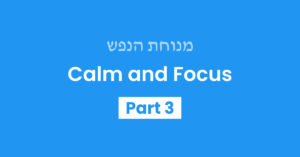We have been learning this month about the middah of Menuchas HaNefesh.
Although the word “Menucha” literally means “rest,” having Menuchas HaNefesh doesn’t mean to just sit back and relax and stop doing everything. We explained that having Menuchas HaNefesh means being totally focused on what we are doing – not thinking about the past, nor worrying about the future. This sense of Menuchas HaNefesh is essential for our avodas Hashem, because without it, we cannot daven properly, learn properly, do mitzvos properly, or give proper attention to our friends and family.
How can we achieve this sense of calm focus? We explained that one way to do it is to remember that Hashem is taking care of all our needs, so we don’t need to worry.
We remind ourselves of this truth every week when Shabbos comes: Every Friday after sunset, we stop doing all creative activity, and remember that just as Hashem created the world in 6 days and rested on the 7th, so too, He is constantly creating and re-creating the world every single second. Even though it may seem as if I am running carpool, earning money, and writing articles, the truth is that all my energy and creativity and success comes only from Hashem. It is a mere illusion that we think we are carrying these burdens on our shoulders. We do need to invest the appropriate amount of hishtadlus (effort), but, ultimately, everything is in Hashem’s hands, so we don’t need to worry.
Finally, we discussed how one particularly important time to have Menuchas HaNefesh is during davening. It is only appropriate that we should clear our minds and have total focus when we are speaking to the Creator of the World who loves us so much and is eager and ready to take care of our needs, if we would only just ask for it.
How do we achieve this clear mind that we need for tefillah? We explained that since it’s impossible for the human mind to think about nothing at all, we’ll have to choose something else to think about instead. What should we think about? We can think about how we are in Hashem’s hands, like a baby resting calmly in its mother’s arms. This is why Chazal included many pesukim in the beginning of davening to remind us of this truth, such as “Karov Hashem Lechol Korav – Hashem is close to all those who call out to Him.”1
As we can see, there are so many opportunities to practice Menuchas HaNefesh in our lives, and it is such an essential middah to develop. As we go on to focus on a different middah next month, let’s keep in mind the importance of Menuchas HaNefesh and try to practice it whenever we can.
Sources: [1] Tehillim 145:18
Your Challenge
Once a day, before doing an activity, pause and think: “I am going to do this activity with Menuchas Hanefesh.” Then do the activity with your full attention, being fully present.
- FOR EXAMPLE:
- Say a bracha while focusing completely on the words, not thinking about anything else.
- Learn for 5 minutes while focusing completely on what you’re learning.
- Listen fully while someone is talking to you.
- Concentrate fully on a small section of davening.




